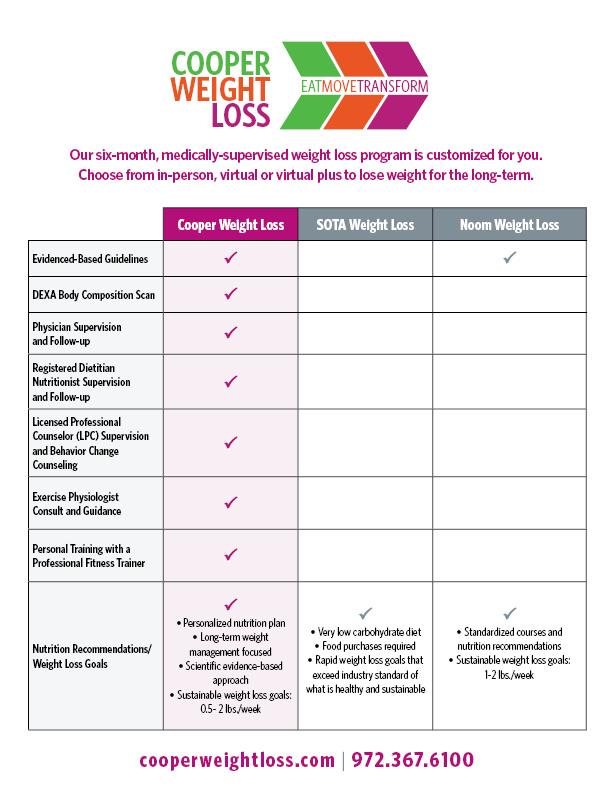With so many weight loss programs available today promising guaranteed success and life-changing results, how do you know which program is ideal for you? Cooper Weight Loss Team Lead Lizzy Mungioli, RDN, LD, compares key features of three popular diet programs, including Cooper Weight Loss, to help you weed out weight loss gimmicks and use credible resources on your journey to success.
Welcome and warning signs
When designing a solid, successful and reliable weight loss program, a variety of components are involved, most importantly, support from professional experts in the following areas:
- Nutrition
- Exercise and fitness
- Medical oversight
- Behavioral and mental health
This combination of expertise is vital for long-term success and healthy habit changes. Programs that make specific or lofty promises (such as guaranteeing a specific amount of weight loss) should be considered as red flags. In addition, some weight loss programs truly do not provide the type of support, education or resources one needs to successfully lose weight and most importantly keep it off.
Nutrition and weight loss are heavily intertwined with science. Having evidence-based guidelines from scientifically proven research is crucial to providing someone with credible information and steering them in the right direction for weight loss success.
Tailored tools for success
Cooper Weight Loss (CWL) is an example of a scientific evidence-based weight loss program. CWL does not involve gimmicks, lofty goals, false promises, pills or prepackaged food. It is a six-month, medically-supervised, comprehensive and multi-disciplinary program including a weight loss maintenance component to help ensure success well after program completion. CWL includes:
- Medical supervision from a Cooper Clinic physician
- A physical exam
- Lab work
- Blood pressure
- Exercise clearance (to ensure an individual’s safety when starting an intensive weight loss program)
- Registered dietitian nutritionist
- Licensed professional counselor
CWL also includes bi-weekly visits with a registered dietitian nutritionist at Cooper Clinic who specializes in obesity and weight management throughout the course of the six-month program. A licensed professional counselor (LPC) also goes through a Behavioral Health Consultation with each patient prior to entry in the program. This is helpful for determining a patient’s mentality, stability and readiness going into the program as well as evaluates their character traits to determine the best methods of education and support.
The LPC also serves to provide a safe space for learning tools to better manage stress in healthier ways than coping with food. Patients visit with the LPC at least four times throughout the program with additional visits always encouraged at the discretion of the patient or LPC. CWL also provides clients with resources to build fitness habits including meeting with an exercise physiologist and personal trainer multiple times along with a complimentary six-month Cooper Fitness Center membership to set them up for optimal success.
CWL provides a myriad of tools tailored for individualized success. The diet recommendations are completely personalized based on the client’s food preferences, calorie needs and health status. No diet is a one-size-fits-all. CWL honors the principle of individualizing each client’s diet and exercise regimen in a way they can adhere to the plan by encouraging sustainable weight loss goals of 0.5-2 pounds per week.
How does CWL measure up to SOTA and Noom?

SOTA
In contrast to CWL, State of the Art (SOTA) Weight Loss is a weight loss program using prepackaged food products intended to be consumed for breakfast, lunch, dinner and snacks. The SOTA diet prescription is low-carb with an emphasis on a lot of non-starchy vegetables and lean proteins, including when dining out. Alcohol is also highly discouraged in this program. A coach, whom the program refers to as a “consultant,” is available to each client for guidance in their weight loss goals; however, these consultants are not registered or licensed dietitian nutritionists. The program determines one’s goal weight based on body composition measurements using the Tanita scale, which is less accurate than a DEXA scan. Lab work, physician oversight, LPC visits are not included in this program nor screening for diabetes, high blood pressure, sleep apnea or other medical conditions. SOTA’s recommended weight loss goals are three pounds per week for women and four to five pounds per week for men, which make these goals not only unattainable but often unsustainable. The program charges clients a minimum of $200 per week with an indefinite amount of time set for the program’s length.
Noom
Noom on the other hand is a web-based app that can be used on desktop or one’s smart phone. It includes standardized courses and nutrition recommendations as well as a space for logging meals and exercise. It encourages a healthy weight loss rate of one to two pounds per week and support the use of mindfulness to regulate appetite and food intake. Noom, however, does not include the expertise of registered dietitian nutritionists, medical supervision, LPC support or exercise recommendations from a fitness specialist.
Overall, each weight loss program has pros and cons depending on one’s preferences and needs. The key is to ensure individuals have the support necessary to be consistent with their behavior change and to utilize healthy, sustainable methods for long-term weight loss based on science. CWL transforms participants’ lives through healthy eating, exercise and behavior change counseling. At Cooper Clinic, we believe that sustainable and successful weight loss is possible with the proper guidance and support each step of the way in your weight loss journey.

Click here to begin your transformation with Cooper Weight Loss today, or call 972.367.6100 to learn more about Cooper Weight Loss virtual options.
Article provided by Lizzy Mungioli, RDN, LD, Cooper Weight Loss Team Lead, and Cooper Clinic Nutrition Services.
